Central Asia – Tim Wahl and “Footballogy” growing the game in Kyrgyzstan
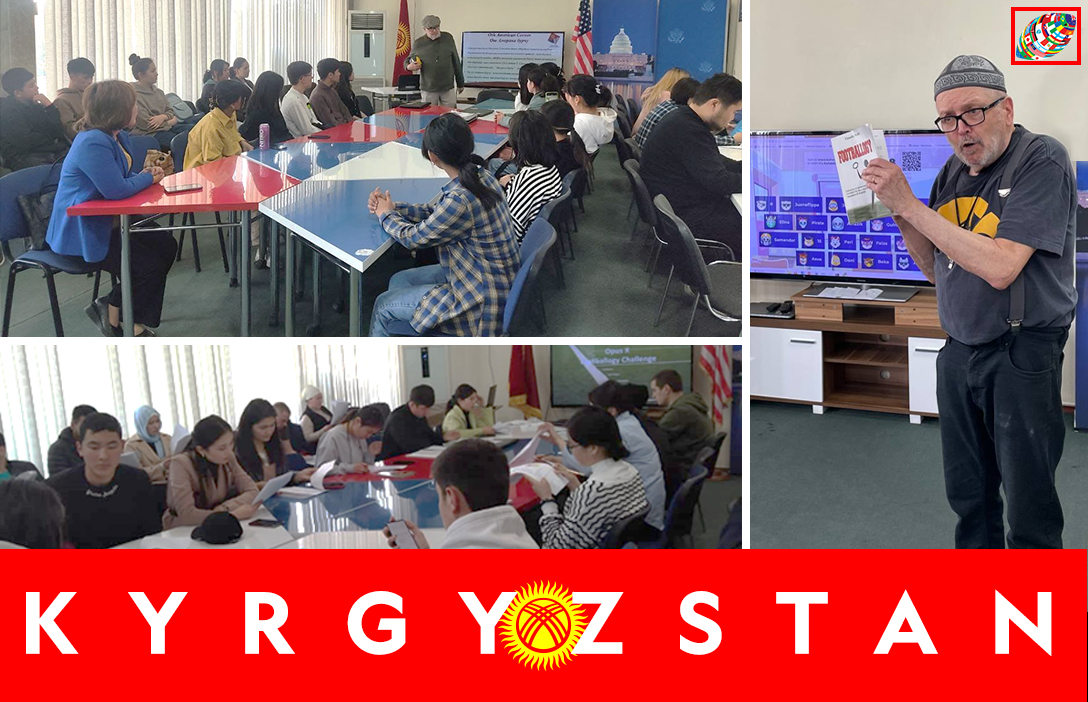
American football is anything but proportionate in its distribution across the world, but it’s making headway one yard at a time on roads less traveled. Look no further than Central Asia for this, particularly the tiny landlocked nation of Kyrgyzstan. Officially the Kyrgyz Republic and popularly referred to as the Switzerland of Asia for its high mountains and breathtaking vistas, this ancient land where horseback riding and falconry mark the spot once roamed by Genghis Khan is about the last place on earth to expect American football.
But that game that uses an oblong ball that evolved from harpastum in the Roman Empire made a scene last fall in the city of Osh, in Kyrgyzstan’s southern tier, a population just over 300,000 which somehow maintains a village-like feel. Isolated, the place is not so easy to get to except by air in winter.
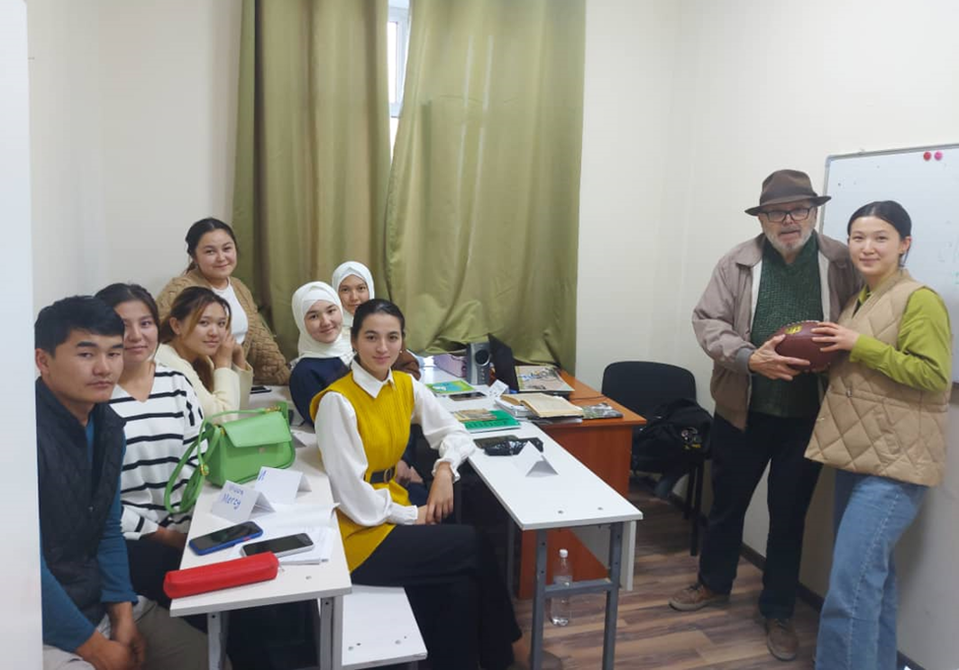
Class at Osh State University in Osh, Kyrgyzstan, participates in a discussion of American football.
A gentleman by the name of Tim Wahl, in fact, designated an English Language Fellow by the US State Department, landed in this 3000-year-old vestige of the Silk Road with archeological finds dating to the Bronze Age to do what no one had done before. While Wahl’s main task was to teach English and teaching methods at a local university, he had considerable leeway with other things as long as they pertained to language learning and possessed cultural significance. Teaching American football was right up this alley. Thus was the genesis of a class, or, rather, a talking club called Footballogy, at the American Corner in Osh [pronounced with a long “o” lest it be mistaken for a national culinary delicacy].
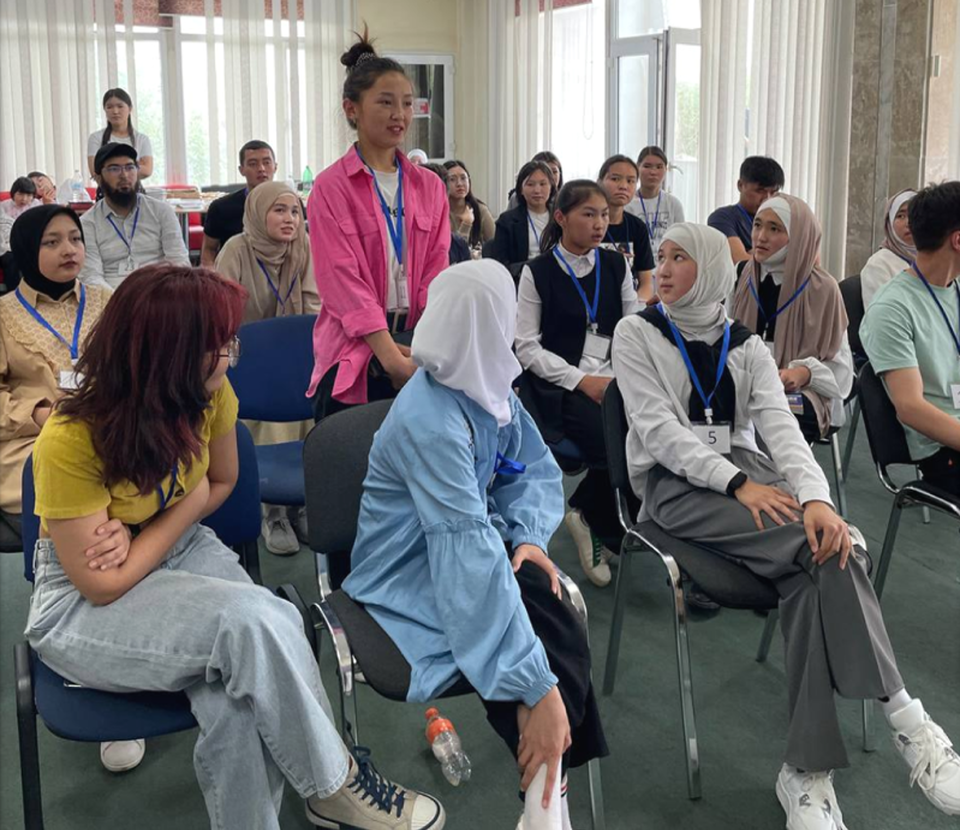
A Footballogy Challenge Contestant delivering her answer.
“You’ll be a rock star,” kidded Miranda Lupion, Public Affairs Officer at the US Embassy in Bishkek, Kyrgyzstan’s capital, on the day Wahl headed out for his post.
These parting words were not far off, resulting in participants as young as 11 up to young adults joining Footballogy, whose name was lifted from his book “Footballogy: Elements of American Football for Non-Native Speakers of English (ESL Publishing 2020). For most, not only was this the first time to view an American football, which Wahl had brought, from his home in Glendale, California but it was also a first kinesthetic experience to actually handle an American football, which occurred in participant introductions where members tossed the ball albeit awkwardly to the next speaker.
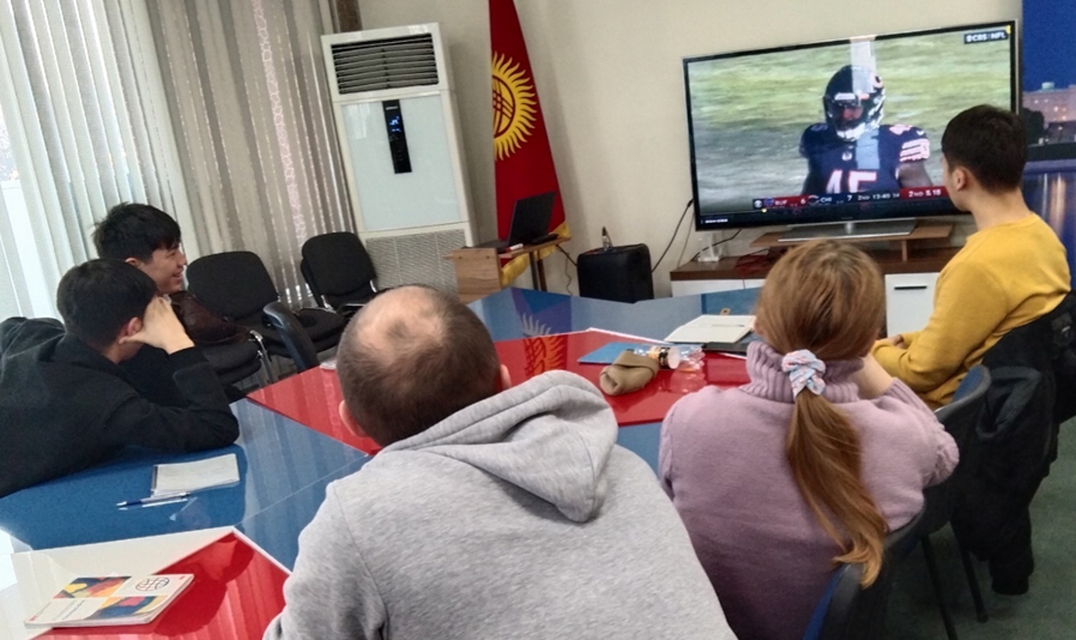
Footballogy club members looking at game highlights, which helped them learn the game and vocabulary and idiomatic expressions
Wahl also took this practice to his classrooms, at Osh State University, where students who had the floor were thrown the ball, a technique he used periodically throughout the year. From time to time, he led his classes to a nearby park to play catch, where local kids who happened by joined impromptu drills, such as they were. Call it Kyrgyzstan’s version of sandlot football. This provided a chance to introduce a “plug and play” football lexicon often used in everyday English.
One Footballogy club member named Maria had a surprising knack for throwing a tight spiral. She explained she had played tackle football on a woman’s team in her native Russia. “I love this game,” she bubbled, adding that her experience started in childhood. At Wahl’s urging, she demonstrated to the class proper gripping and passing technique.
American Football has a niche in Russia, as evidenced in a documentary he showed called Get Up and Touchdown about women from St. Petersburg who play tackle football.
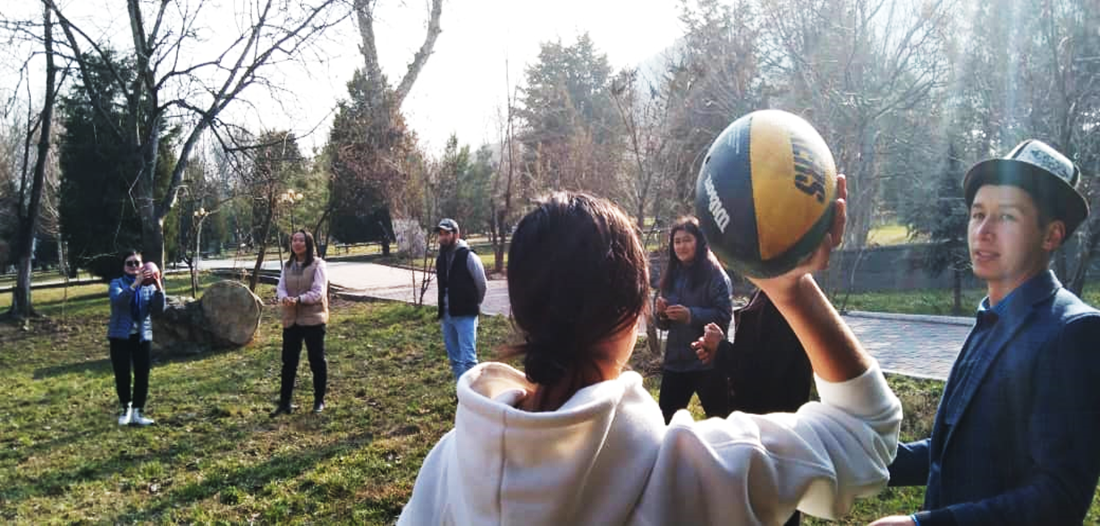
Students round up in April for first session of flag football in Osh, Kyrgyzstan, which involved instruction on gripping the ball, throwing technique, catching and hiking the ball.
The Footballogy program embodied what Wahl refers to as “edu-tainment,” a mixture of videos and lessons on anything American football. Participants got a grounding on the history of American football, the rules of the game, equipment, and player positions, and they got the hang of football lingo like “hang time,” “hail Mary” and “pick six.”
“I wish I had this (Footballogy) before I studied in America,” said a participant named Mirgul, who described her year at Washington State University. “I didn’t understand a thing,” she said of a football game she attended. “Everyone around me was excited. Not me. I was bored.”
A tackle program in Bishkek, the capital of Kyrgyzstan, had existed from 2002 to 2015, but awareness or activity in the sport has been quiet until Footballogy.
The impetus of Footballogy goings on in Osh was not lost on the US Embassy in Bishkek, which invited Wahl to lead a Facebook Live stream on Super Bowl LVII.
Wahl, who characterizes his teaching style as connecting learning to real life, pounced on a teaching moment in January. A session on injury risks in football coincided with the near-death experience of Damar Hamilin of the NFL’s Buffalo Bills. Students created get-well cards, which the US Embassy tweeted about before sending the packet, which included a map of Kyrgyzstan, to Damar.
Their action was rewarded with a response from Sean McDermott, head coach of the Bills:
“We really did appreciate the kind gesture, support, thoughts, and prayers. It means a lot to us all. I sincerely thank you for allowing your students to do that.”
English language students in the Kyrgyz Republic practiced writing get well cards to .@HamlinIsland.❤️🩹@BuffaloBills the cards are on their way to you from the U.S. Embassy in Bishkek 🇺🇸. As we say in 🇰🇬 — жакшы болуп кетиңиз (get well soon)! .@NFL pic.twitter.com/jmTCrxRedA
— U.S. Embassy Bishkek (@USEmbassyKG) January 31, 2023
The grand finale of Footballogy arrived in May with the “Footballogy Challenge,” a sponsored quiz show where members competed for prizes of cash and football-related items. “This was lavish, truly a community event” reflected Wahl, whose role doubled as game show host. He praised the support of a local non-profit and a restaurant for prizes and a gastronomic spread for the dozens of contestants and guests.
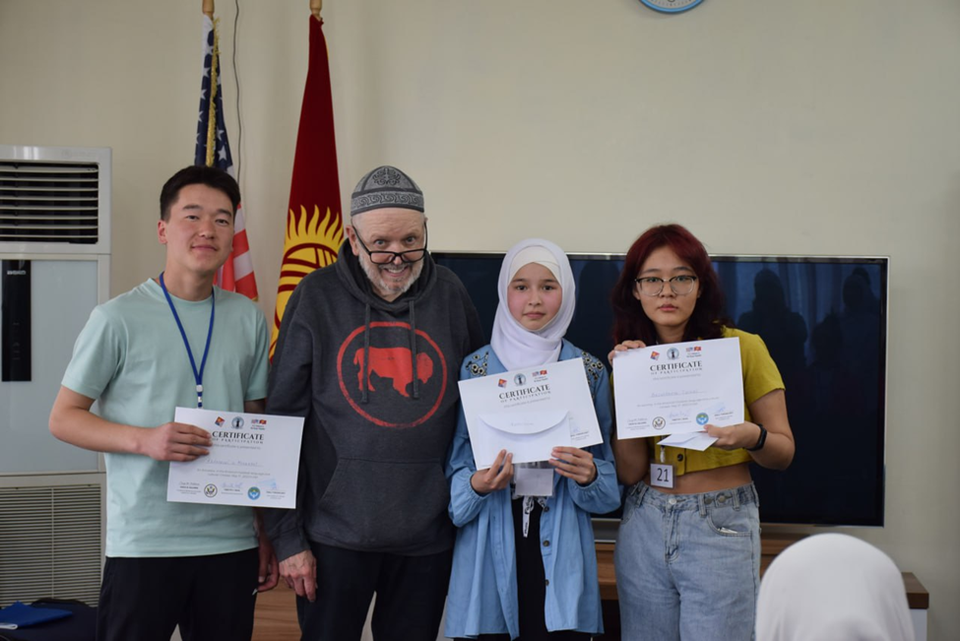
The top three finishers of the Footballogy Challenge, on May 17th, a quiz show on American football.
The curtain falling on Footballogy does not signify the end but a segue to pending kickoff of flag football. Wahl credits Erali Torogeldiev, the director of American Corner, for helping him procure flag football sets from a program in neighboring Kazakistan, where both tackle and flag leagues flourish. The challenge, Wahl explains, is not finding participants or place to play but to select and train coaches who can sustain the program after he leaves his post in July.
“It’s wide open as to what the program will evolve to,” says Wahl, observing the international growth of flag football. “For now, it’s baby steps, fun and recreation with immense health benefits where participants can learn teamwork and leadership.”
